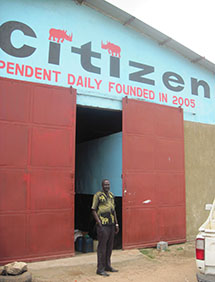Nairobi, August 5, 2015—Authorities in South Sudan have shut down three independent media outlets in the past five days, according to news reports and the outlets’ editors. The Committee to Protect Journalists condemns the closures, which come as international mediators seek to arrive at a peace deal between the government and the armed opposition following months of civil war.
Tens of thousands of people have been killed and nearly two million displaced since the civil war started in December 2013, pitting forces loyal to President Salva Kiir against those supporting former vice-president Riek Machar, news reports said. The South Sudanese government has come under pressure by the international community to sign a peace deal brokered by the Intergovernmental Authority on Development, an eight-country trade bloc in Africa, later this month. Local journalists told CPJ authorities are cracking down on the media as pressure mounts on the government to commit to a peace deal.
“South Sudan’s press has been constrained since this conflict began. Now authorities seem to be ratcheting up the pressure,” said CPJ East Africa Representative Tom Rhodes. “We call on the government in Juba to reopen these news outlets and allow all journalists to freely carry out their duties.”
Security agents on Tuesday raided the offices of the independent media outlet Free Voice South Sudan in the capital, Juba, at around 2 p.m. and sealed off the premises, according to news reports and local journalists. Free Voice produces radio programs including the serial drama “Sawa Shabaab” (“Youth Together”) and “Na’eesh Mabath” (“Living Together”), a radio series about traditions and contemporary conflict-resolution mechanisms, according to a statement by the media outlet.
The U.S.-backed broadcaster Voice of America shares the same offices as Free Voice and was forced to shut down as well, news reports said. Hildebrand Bijleveld, the programs director for Free Voice, told CPJ the outlet was in compliance with the law and had done nothing to “concern the government.”
No reason or time frame were given for the shutdown.
On Monday, a security officer called the independent English-language daily newspaper, The Citizen, and ordered the staff to stop printing the publication until further notice, Chief Editor Nhial Bol told CPJ. The paper complied. Bol told CPJ that security officials accused him of “promoting the opposition” by covering a recent conference of 16 allied opposition parties and condemned an editorial written by Bol that compared South Sudan’s current political crisis to Somalia’s, he said.
Security forces on Saturday ordered the Arabic daily Al-Rai to shut down, accusing one of the paper’s board members of joining rebel forces in Nairobi, the paper’s chief editor, Michael Wazir, told CPJ. Wazir said that the board member had traveled to Nairobi to visit family members. He said the paper’s staff was trying to negotiate with the authorities about resuming publication.
Bol told CPJ that the shutdown of the outlets contradicts South Sudanese media laws as well as the constitution, which protects press freedom.
CPJ’s repeated calls to Paul Jacob, the government’s director of public information, and Ateny Wek Ateny, government spokesman, were not answered.
Officials have targeted the press throughout the conflict, which has led to self-censorship as journalists try to avoid harassment and closures, according to CPJ research. In February, national security agents shuttered the independent English daily Nation Mirror, accusing it of publishing “anti-government articles,” Chief Editor Wol Deng Atak told CPJ. At least five journalists have been killed in direct relation to their work in South Sudan this year, according to CPJ research. The journalists were killed by unidentified gunmen on January 25, 2015, during an ambush of an official convoy traveling through Western Bahr al Ghazal state, according to reports.
- For data and analysis on South Sudan, visit CPJ’s South Sudan page.
